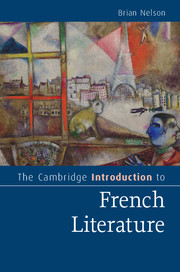Book contents
- Frontmatter
- Dedication
- Contents
- Preface
- Acknowledgements
- Chronology
- 1 Villon: a dying man
- 2 Rabelais: the uses of laughter
- 3 Montaigne: self-portrait
- 4 Corneille: heroes and kings
- 5 Racine: in the labyrinth
- 6 Molière: new forms of comedy
- 7 La Fontaine: the power of fables/fables of power
- 8 Madame de Lafayette: the birth of the modern novel
- 9 Voltaire: the case for tolerance
- 10 Rousseau: man of feeling
- 11 Diderot: the enlightened sceptic
- 12 Laclos: dangerous liaisons
- 13 Stendhal: the pursuit of happiness
- 14 Balzac: ‘All is true’
- 15 Hugo: the divine stenographer
- 16 Baudelaire: the streets of Paris
- 17 Flaubert: the narrator vanishes
- 18 Zola: the poetry of the real
- 19 Huysmans: against nature
- 20 Mallarmé: the magic of words
- 21 Rimbaud: somebody else
- 22 Proust: the self, time and art
- 23 Jarry: the art of provocation
- 24 Apollinaire: impresario of the new
- 25 Breton … Company: Surrealism
- 26 Céline: night journey
- 27 Sartre: writing in the world
- 28 Camus: a moral voice
- 29 Beckett: filling the silence
- 30 French literature into the twenty-first century
- Notes
- Further reading
- Index of authors and titles
- Index of genres, movements and concepts
- Cambridge Introductions to …
- References
21 - Rimbaud: somebody else
Published online by Cambridge University Press: 05 July 2015
- Frontmatter
- Dedication
- Contents
- Preface
- Acknowledgements
- Chronology
- 1 Villon: a dying man
- 2 Rabelais: the uses of laughter
- 3 Montaigne: self-portrait
- 4 Corneille: heroes and kings
- 5 Racine: in the labyrinth
- 6 Molière: new forms of comedy
- 7 La Fontaine: the power of fables/fables of power
- 8 Madame de Lafayette: the birth of the modern novel
- 9 Voltaire: the case for tolerance
- 10 Rousseau: man of feeling
- 11 Diderot: the enlightened sceptic
- 12 Laclos: dangerous liaisons
- 13 Stendhal: the pursuit of happiness
- 14 Balzac: ‘All is true’
- 15 Hugo: the divine stenographer
- 16 Baudelaire: the streets of Paris
- 17 Flaubert: the narrator vanishes
- 18 Zola: the poetry of the real
- 19 Huysmans: against nature
- 20 Mallarmé: the magic of words
- 21 Rimbaud: somebody else
- 22 Proust: the self, time and art
- 23 Jarry: the art of provocation
- 24 Apollinaire: impresario of the new
- 25 Breton … Company: Surrealism
- 26 Céline: night journey
- 27 Sartre: writing in the world
- 28 Camus: a moral voice
- 29 Beckett: filling the silence
- 30 French literature into the twenty-first century
- Notes
- Further reading
- Index of authors and titles
- Index of genres, movements and concepts
- Cambridge Introductions to …
- References
Summary
I is somebody else
– Rimbaud, Letter to Georges Izambard, 13 May 1871Arthur Rimbaud (1854–91) was one of the most challenging and liberating influences on modern French culture – always on the move in his life and in his writing, always on his way to somewhere else, assuming and casting off identities as he went. There was the child prodigy, at fifteen writing poetry that showed a complete mastery of French classical forms and prosody, combined with a stunningly original style. There was the teenage rebel, the filthy, foul-mouthed peasant boy, repudiating family and religion, turning up in Paris and scandalizing the literary establishment with his iconoclastic views on poetry and his amazingly anti-social behaviour. There was the relationship with Verlaine and the vagabond years spent with the older poet in Paris, London and Brussels. Meanwhile, by the age of twenty, Rimbaud had composed a body of work that is widely considered one of the most innovative and significant of the French nineteenth century.
The poet as seer
Rimbaud's early years were spent on a farm at Roche, near the Belgian border, and then in the small nearby town of Charleville. He was brought up by his mother – his father, an army officer, having left her when Rimbaud was six. Vitalie Rimbaud, with her peasant avarice, grim piety, social ambition and iron discipline, cast a long shadow over her son's life. Ironically, Rimbaud got from his mother the toughness and determination he needed to escape from her and from everything she represented for him. He ran away to Paris when he was fifteen. His first views of the city were through the grill in the back of a police wagon, for he was arrested on arrival at the railway station for travelling without a ticket. After a few days, he was released, and made his way circuitously back home. He returned to Paris a few months later, this time with a ticket. Back in Charleville, he was greatly excited when Paris declared itself an independent people's republic, and in the spring of 1871 he decided to return to the capital to witness the dawn of the new age.
- Type
- Chapter
- Information
- The Cambridge Introduction to French Literature , pp. 151 - 160Publisher: Cambridge University PressPrint publication year: 2015

